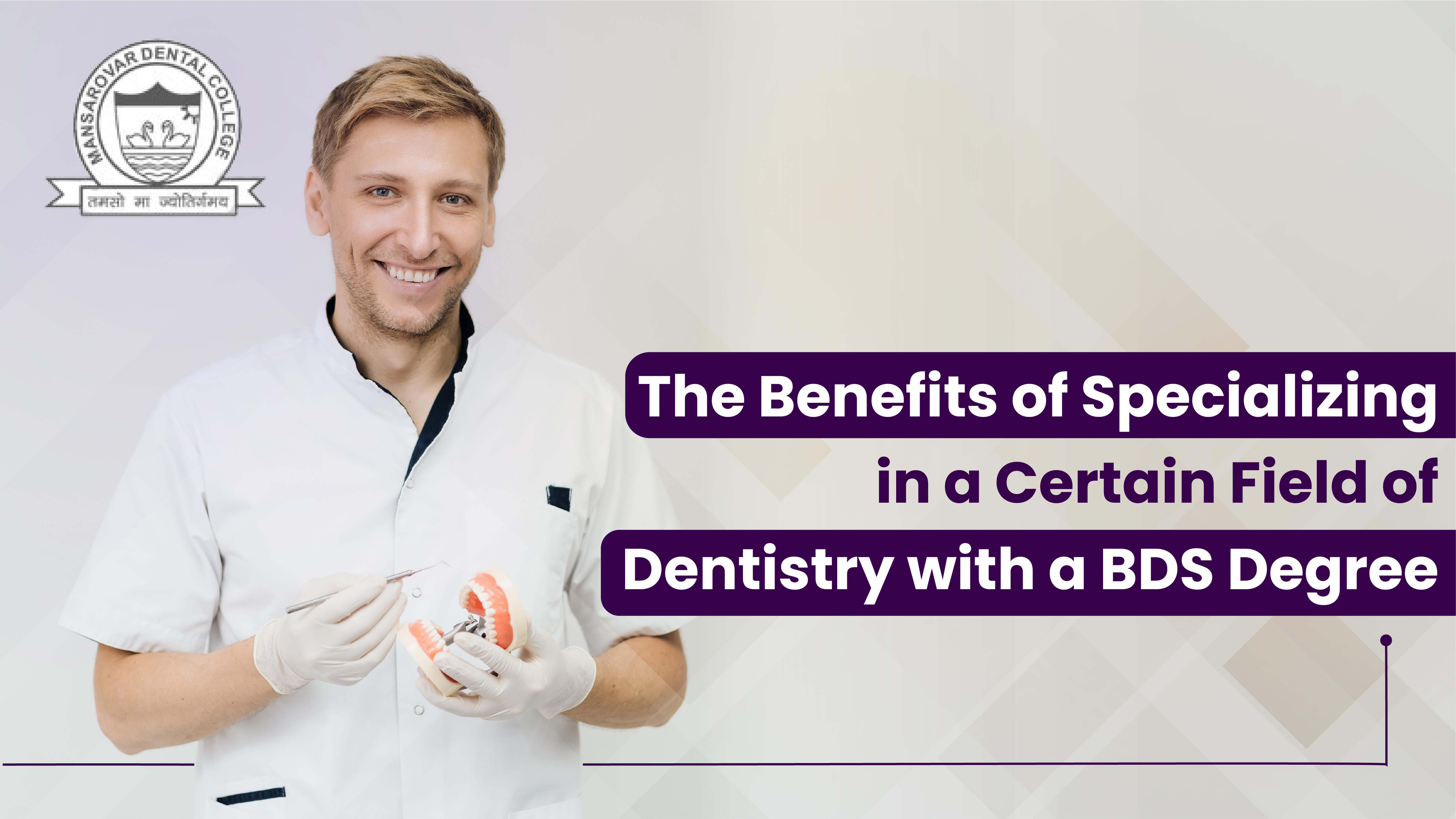
The dental industry is getting stabilized in recent years by educating the importance of oral hygiene among the global population. Enlightenment into oral hygiene and dental care has awakened the students’ community to take up dental courses such as the BDS degree. According to world dental demographics provided by the National Library of Medicine, the dentist's rate has increased by 27.8% over ten years from 1990 in 73 countries around the world. In recent years, dentistry is emerging as one of the most demanded professions.
This article will help you know more about dental courses, their benefits, and much more for your bright future:
India has got top dental colleges that provide remarkable dental education. We, Mansarovar Dental College, one of the best dental colleges in India offer the following dental courses:
| Level | Dental course | Duration | Eligibility criteria | Admission process |
|---|---|---|---|---|
| Undergraduate level | Bachelor of Dental Surgery (BDS) | 4+1(Compulsory Rotatory Internship) |
|
Admission is based on NEET qualification. |
| Postgraduate level | Master of Dental Surgery (MDS) | 3 years |
|
Admission is based on NEET PG qualification. |
BDS is an undergraduate dental course that covers the basics of a lot of dental specializations. Here are some of the BDS specialization subjects that are taught during the course:
We at Mansarovar Dental College(MDC) provide the best specializations after BDS in MDS. We provide the following MDS specializations:
| MDS Specializations | Description | Benefits |
|---|---|---|
| Orthodontics & Dentofacial Orthopedics | Deals with diagnosis, prevention, and correction of malocclusion in the oral jaws: mandible, and maxilla |
|
| Periodontics | Deals with diseases in supporting and investing structures of the teeth such as gums, cementum, periodontal membrane, and alveolar bone. |
|
| Prosthodontics and Crown & Bridge | Deals with the maintenance and restoration of oral structures. |
|
| Conservative Dentistry & Endodontics | Conservative dentistry deals with the prevention and treatment of diseases and injuries originating in the teeth while endodontics deals with the prevention and treatment of pulp and periauricular diseases. |
|
Pursuing MDS is highly important as students pursuing MDS after BDS in the best dental colleges enjoy a lot of benefits in their careers. Here are some of the benefits that MDS graduates get over BDS graduates:
Pursuing MDS will increase the ability to gain high educational knowledge in the dental field which will be a boon in your dental career.
By pursuing MDS, students get the chance of pursuing their desired specializations out of the BDS specialization subjects that were educated in BDS degree.
Pursuing MDS opens the door to increased research opportunities in different specialties. It increases the chance of getting funds for your dental research.
Hospitals, dispensaries, clinics, and much more hire MDS graduates rather than BDS graduates. This is because of the in-depth knowledge of MDS doctors compared to BDS doctors.
According to Payscale and Ambition box, MDS doctors earn more than BDS doctors. The average salary of an MDS doctor is estimated to be between INR 49,000/- to INR 1 Lakh whereas BDS graduates earn around INR 16,790 per month.
As a gist, MDS benefits are way more appreciable than BDS. MDS after BDS helps dental graduates to explore greater job opportunities with higher pay scales and extraordinary perks.
Let us have a look into different available jobs after BDS in India as well as abroad: jobs after BDS in India
| Government jobs | Private jobs |
|---|---|
|
|
Here are the graphs that depict the salary scale for different government and private jobs respectively:
Here is a graph that depicts average salary of BDS jobs abroad:
Job aspects after MDS are highly upgraded compared to BDS. Salary scales are much better based on the chosen specializations in MDS. The table below gives an idea about the average salary for different MDS specializations and their positions:
| MDS specializations | Job positions | Average salary in INR |
|---|---|---|
| Orthodontics & Dentofacial Orthopedics | ||
| Dentist Dental Hygienist Oral Pathologist Dental Surgeon Professor |
2.5-3 LPA 6-9 LPA 6-10 LPA 3-6 LPA 7-8 LPA | |
| Periodontics | ||
| Private Clinic Practitioner Government Sector Practitioner Researcher Healthcare Panelist |
2 LPA 5 LPA 4.7 LPA 12 LPA | |
| Prosthodontics and Crown & Bridge | ||
| Oral Pathologist Dental Surgeon Clinical Microbiologists Medical Representative |
10-15 LPA 5-6 LPA 2-4 LPA 4-6 LPA | |
| Conservative Dentistry & Endodontics | ||
| Dentist Oral Surgeon Dental Lab Technician Orthopedist |
3-6 LPA 5-7 LPA 2-4 LPA 8-10 LPA |
The dental industry is today’s fast-blooming sector which was valued at USD 359.5 billion in 2021 and is expected to grow at a Compound Annual Growth Rate of 4.4% from 2022-2030. Emerging as a huge market, the dental industry requires skilled dental professionals. Students pursuing BDS degree and planning to pursue MDS are in high demand in the dental industry and so choosing dental courses are highly beneficial in the upcoming years.
1. What is the average fee for a BDS course?
Average fees for a BDS degree will be between INR 50,000 to INR 4 LPA.
2. List other specializations in MDS.
3. Can BDS graduates pursue MBA?
Yes, BDS graduates can pursue MBA.
4. Is BDS equivalent to MBBS?
By the level of degree, both BDS and MBBS are undergraduates. But, BDS deals with dentistry exclusively while MBBS deals with general medicine.
5. Can MBBS graduates pursue MDS?
No, MBBS graduates cannot pursue MDS.
© 2017 Mansarovar Dental College Powered by SynQues